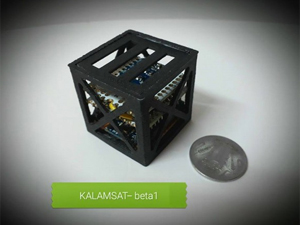



Date:23/05/17
 For an Indian student, even the sky is not the limit. Eighteen-year-old Rifath Shaarook designed what he describes as the world’s lightest satellite, from scratch. The device weighs a mere 64 grams (0.14 lbs), making it even lighter than a smartphone. “We did a lot of research on different cube satellites all over the world and found ours was the lightest,” Shaarook said about his 3D-printed, carbon fiber small-scale satellite.
For an Indian student, even the sky is not the limit. Eighteen-year-old Rifath Shaarook designed what he describes as the world’s lightest satellite, from scratch. The device weighs a mere 64 grams (0.14 lbs), making it even lighter than a smartphone. “We did a lot of research on different cube satellites all over the world and found ours was the lightest,” Shaarook said about his 3D-printed, carbon fiber small-scale satellite.
Named KalamSat, the device is named after India’s “Missile Man,” former president APJ Abdul Kalam. Kalam was a space-research pioneer in the country and he led India’s Integrated Guided Missile Development Programme.
“It will have a new kind of on-board computer and eight indigenous built-in sensors to measure acceleration, rotation and the magnetosphere of the earth,” the budding scientist told Business Standard about his 4-centimeter cube design. Shaarook and his team created the satellite for under Rs1 lakh ($1,561).
The 12th grader’s design scored him a win in the “Cubes in Space” competition for school-age students, organized by the US National Aeronautics and Space Administration (NASA) and the education organization I Doodle Learning. His prize? The device will now go on a four-hour mission aboard a sub-orbital flight during which it will operate for around 12 minutes in a micro-gravity environment of space.
KalamSat is one of 80 experiments to be selected from among 86,000 designs from 57 countries. It will be launched on a research rocket from Nasa’s six-square-mile Wallops Island Facility in Virginia on June 22, Amber Agee-DeHart, the founder of Cubes in Space program told Quartz. (The rocket will enter space for a few minutes, not orbit the Earth. The purpose is to test whether or not the 3D-printed technology will withstand launch conditions.)
Shaarook, who hails from the town of Pallapati in the south Indian state of Tamil Nadu, is the lead scientist at Chennai-based space education and innovation organization Space Kidz India, BBC reported. The outfit sponsored his research.
Indian Teen Develops World’s ‘Smallest’ Satellite
 For an Indian student, even the sky is not the limit. Eighteen-year-old Rifath Shaarook designed what he describes as the world’s lightest satellite, from scratch. The device weighs a mere 64 grams (0.14 lbs), making it even lighter than a smartphone. “We did a lot of research on different cube satellites all over the world and found ours was the lightest,” Shaarook said about his 3D-printed, carbon fiber small-scale satellite.
For an Indian student, even the sky is not the limit. Eighteen-year-old Rifath Shaarook designed what he describes as the world’s lightest satellite, from scratch. The device weighs a mere 64 grams (0.14 lbs), making it even lighter than a smartphone. “We did a lot of research on different cube satellites all over the world and found ours was the lightest,” Shaarook said about his 3D-printed, carbon fiber small-scale satellite.Named KalamSat, the device is named after India’s “Missile Man,” former president APJ Abdul Kalam. Kalam was a space-research pioneer in the country and he led India’s Integrated Guided Missile Development Programme.
“It will have a new kind of on-board computer and eight indigenous built-in sensors to measure acceleration, rotation and the magnetosphere of the earth,” the budding scientist told Business Standard about his 4-centimeter cube design. Shaarook and his team created the satellite for under Rs1 lakh ($1,561).
The 12th grader’s design scored him a win in the “Cubes in Space” competition for school-age students, organized by the US National Aeronautics and Space Administration (NASA) and the education organization I Doodle Learning. His prize? The device will now go on a four-hour mission aboard a sub-orbital flight during which it will operate for around 12 minutes in a micro-gravity environment of space.
KalamSat is one of 80 experiments to be selected from among 86,000 designs from 57 countries. It will be launched on a research rocket from Nasa’s six-square-mile Wallops Island Facility in Virginia on June 22, Amber Agee-DeHart, the founder of Cubes in Space program told Quartz. (The rocket will enter space for a few minutes, not orbit the Earth. The purpose is to test whether or not the 3D-printed technology will withstand launch conditions.)
Shaarook, who hails from the town of Pallapati in the south Indian state of Tamil Nadu, is the lead scientist at Chennai-based space education and innovation organization Space Kidz India, BBC reported. The outfit sponsored his research.
Views: 364
©ictnews.az. All rights reserved.Similar news
- Justin Timberlake takes stake in Facebook rival MySpace
- Wills and Kate to promote UK tech sector at Hollywood debate
- 35% of American Adults Own a Smartphone
- How does Azerbaijan use plastic cards?
- Imperial College London given £5.9m grant to research smart cities
- Search and Email Still the Most Popular Online Activities
- Nokia to ship Windows Phone in time for holiday sales
- Internet 'may be changing brains'
- Would-be iPhone buyers still face weeks-long waits
- Under pressure, China company scraps Steve Jobs doll
- Jobs was told anti-poaching idea "likely illegal"
- Angelic "Steve Jobs" loves Android in Taiwan TV ad
- Kinect for Windows gesture sensor launched by Microsoft
- Kindle-wielding Amazon dips toes into physical world
- Video game sales fall ahead of PlayStation Vita launch





















